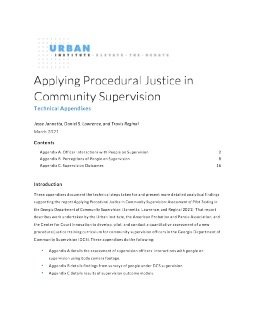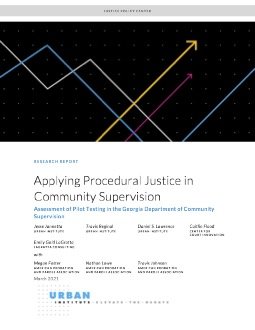By Jesse Jannetta,
, Travis Reginal, Daniel Lawrence, Caitlin Flood, Emily LaGratta
Procedural justice, a framework for authority figures to treat people with fairness and respect, can improve probation supervision and core supervision outcomes. With support from Arnold Ventures, the Urban Institute, the American Probation and Parole Association (APPA), the Center for Court Innovation (CCI), and LaGratta Consulting partnered on an effort to develop and pilot a new procedural justice training curriculum—the Evaluation of Procedural Justice in Probation—outlining new tools and practices for probation officers. Analyses of interactions between supervising officers and people under supervision, survey responses regarding perceptions of supervision, and analyses of administrative data provided mixed findings, with some preliminary indications that participating in the procedural justice training may make probation officers’ treatment of people under supervision fairer and more respectful and improve supervision outcomes. However, the conclusions that can be drawn from even those results supportive of intervention impact are subject to significant limitations, given the nonexperimental nature of the design and the small number of observations in some of the data collected.
Washington, DC: Urban Institute, 2021. 46p.
By Eric G. Lambert, Monica Solinas-Saunders, Nancy L. Hogan
This study examined the influence of job demands (role ambiguity, role conflict, role overload and dangerousness) and job resources (job variety, supervisor structure and training views) on employee perceptions of procedural justice, general perceptions of distributive justice, and specific perceptions of distributive justice. Using a sample of 160 employees at a high-security prison, the regression analyses found that only demands of role conflict was inversely correlated with procedural justice and both distributive justice measures. Role ambiguity was inversely related to procedural but was not related to either dimension of distributive justice. Furthermore, dangerousness was inversely associated with distributive justice (both general and specific), but it was not correlated with procedural justice. Among the job resources, job variety was positively associated with procedural and both distributive justice measures. Supervisor structure was predictive of procedural but not distributive justice. Role overload, and training views had non-significant relationships with all the justice measures.
The Howard Journal of Crime and Justice Volume 63, Issue 1, 2024




